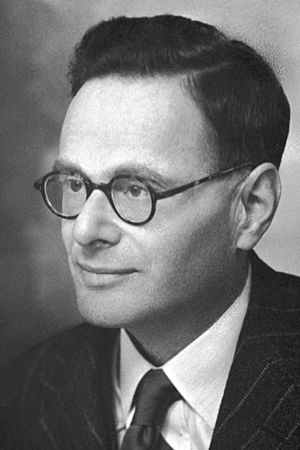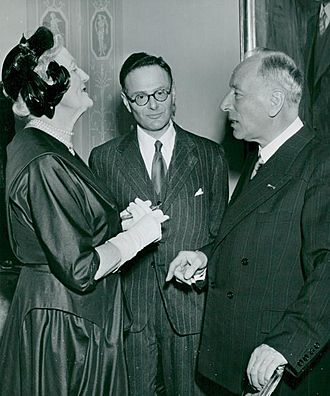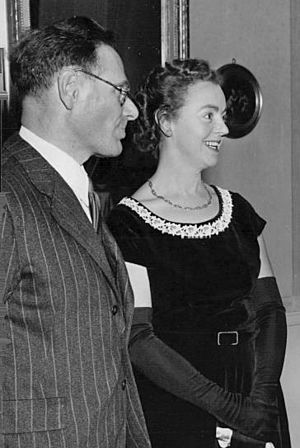Hans Krebs (biochemist) facts for kids
Quick facts for kids
Hans Krebs
|
|
|---|---|
 |
|
| Born | 25 August 1900 |
| Died | 22 November 1981 (aged 81) |
| Nationality | German |
| Citizenship | Naturalised British (from 1939) |
| Alma mater | University of Göttingen University of Freiburg University of Berlin University of Hamburg |
| Known for | Citric acid cycle< Urea cycle Glyoxylate cycle Krebs–Henseleit solution |
| Spouse(s) |
Margaret Cicely Fieldhouse
(m. 1938) |
| Children | Paul, John, and Helen |
| Awards | Albert Lasker Award for Basic Medical Research (1953) Nobel Prize in Physiology or Medicine (1953) Royal Medal (1954) Copley Medal (1961) |
| Scientific career | |
| Fields | Internal medicine, biochemistry |
| Institutions | Kaiser Wilhelm Institute for Biology University of Hamburg University of Cambridge University of Sheffield University of Oxford |
Sir Hans Adolf Krebs (born August 25, 1900 – died November 22, 1981) was a famous German-born British biologist, doctor, and biochemist. He was a pioneer in studying how living cells get energy from food. This process is called cellular respiration.
He is best known for discovering two important chemical reaction cycles in our cells. These are the citric acid cycle and the urea cycle. The citric acid cycle, often called the "Krebs cycle," is how our cells get most of their energy. For this discovery, he won a Nobel Prize in Physiology or Medicine in 1953. With Hans Kornberg, he also found the glyoxylate cycle, a similar process in plants and bacteria.
Krebs passed away in 1981 in Oxford, England. He had worked there for 13 years at the University of Oxford before retiring.
Contents
Hans Krebs's Life Story
Early Years and Education
Hans Krebs was born in Hildesheim, Germany. His father, Georg Krebs, was a surgeon. Hans was the middle child of three.
He went to school at the Gymnasium Andreanum in his hometown. In 1918, near the end of World War I, he was drafted into the army. He took an early high school exam and passed it well. The war ended two months later, and his army service finished.
Krebs decided to become a doctor like his father. He started studying medicine at the University of Göttingen in 1918. In 1919, he moved to the University of Freiburg. He published his first science paper in 1923 about a way to stain tissues for study. He finished his medical course in 1923.
He then spent a year at the University of Berlin to get his medical license. By this time, he wanted to be a medical researcher, especially in biochemistry. In 1924, he studied chemistry and biochemistry in Berlin. He earned his medical degree (MD) in 1925 from the University of Hamburg.
His Scientific Career
In 1926, Krebs joined Otto Heinrich Warburg as a research assistant in Berlin. After four years, in 1930, he moved to a hospital in Altona, part of Hamburg. The next year, he went to the University of Freiburg. There, he could do his own research.
At Freiburg, he and a student, Kurt Henseleit, discovered the ornithine cycle. This is how the body makes urea, a waste product. It's now known as the urea cycle or Krebs–Henseleit cycle. They also created a special liquid called the Krebs–Henseleit buffer. This liquid helps study blood flow. In 1932, he published details of the urea cycle, which made him famous in science.
In 1933, Krebs's life in Germany changed suddenly. Because he was of Jewish background, the new Nazi government fired him from his job. Luckily, Sir Frederick Gowland Hopkins from the University of Cambridge invited Krebs to work with him in England. By July 1933, Krebs was in Cambridge.
He was allowed to bring his research equipment to England. This was very important for his future discoveries. He had a special tool called a manometer that measured how much oxygen tissues used.
In 1935, the University of Sheffield offered him a better job with more lab space. He worked there for 19 years. In 1938, Sheffield University opened a Biochemistry Department, and Krebs became its first head. He became a Professor in 1945. His lab became very big, and people jokingly called it "Krebs's Empire."
In 1954, he moved to the University of Oxford. He worked there until he retired in 1967. Even after retiring, he continued his research and published over 100 more papers.
Personal Life
Hans Krebs met Margaret Cicely Fieldhouse in Sheffield in 1935. They got married in 1938. He said his years in Sheffield were "19 happy years." They had two sons, Paul and John, and a daughter, Helen. Their son John (Sir John Krebs) became a well-known scientist and a member of the British Parliament.
Death
After a short illness, Hans Krebs died in Oxford on November 22, 1981. He was 81 years old.
Major Discoveries
The Urea Cycle
In 1932, Hans Krebs and his student Kurt Henseleit figured out the main steps of the urea cycle. They studied how the body makes urea, a waste product. They found that certain chemicals like ornithine and citrulline were important steps in this process.
Krebs used his special manometer tool to mix liver tissue with these chemicals. He saw that citrulline helped make urea from ammonia and carbon dioxide. This discovery showed how the body gets rid of harmful ammonia. It was the first metabolic cycle ever found!
The Citric Acid Cycle (Krebs Cycle)
At the University of Sheffield, Krebs and William Johnson studied how cells use oxygen to get energy from food. Krebs had thought about this before, but his earlier boss didn't like the idea.
In Sheffield, Krebs worked hard to find the chemical reactions involved. He tested many ideas using his manometer. He found that chemicals like succinate, fumarate, and malate made pigeon muscle tissue use more oxygen.
He then learned about other reactions involving citrate. Krebs realized these chemicals could be the missing pieces. After four months of experiments, Krebs and Johnson figured out the whole sequence of reactions. They called it the "citric acid cycle." It's also known as the "Krebs cycle" or "TCA cycle." This cycle is super important because it's how most living things get energy from their food.
Krebs first sent his discovery to a science magazine called Nature. But the editor rejected it, saying they had too many other articles. So, Krebs quickly sent a longer version to another journal, Enzymologia, and it was published two months later.
The Glyoxylate Cycle
Krebs kept adding more details to his citric acid cycle. In 1957, with Hans Kornberg, he found two new important enzymes. These enzymes helped plants and bacteria use fats for energy in a different way. This new pathway was called the glyoxylate bypass, but now it's known as the glyoxylate cycle.
Awards and Honors

Hans Krebs became a British citizen in 1939. In 1947, he was chosen to be a member of the Royal Society, a famous group of scientists.
In 1953, he won the Nobel Prize in Physiology or Medicine for discovering the citric acid cycle. He shared the prize with Fritz Lipmann. He also received the Albert Lasker Award for Basic Medical Research that same year.
The Royal Society gave him the Royal Medal in 1954 and the Copley Medal in 1961. He was also knighted in 1958, so he became "Sir Hans Krebs."
He received honorary doctorates (special degrees) from 21 different universities. In 2015, his Nobel Prize medal was sold at an auction. The money was used to create the Sir Hans Krebs Trust. This trust helps students studying science and supports chemists who had to leave their home countries.
His Legacy
Many things are named after Hans Krebs to honor his work.
- At the University of Oxford, there was a building called Hans Krebs Tower.
- The University of Sheffield has The Krebs Institute, a research center for biochemistry.
- The Federation of European Biochemical Societies gives out the Sir Hans Krebs Medal for great achievements in biochemistry.
- The Society of Friends of Hannover Medical School gives the Sir Hans Krebs Prize.
- The Biochemical Society offers the Krebs Memorial Scholarship to students studying biochemistry in British universities.
See also
 In Spanish: Hans Adolf Krebs para niños
In Spanish: Hans Adolf Krebs para niños
- List of Jewish Nobel laureates
- List of refugees
 | Kyle Baker |
 | Joseph Yoakum |
 | Laura Wheeler Waring |
 | Henry Ossawa Tanner |


